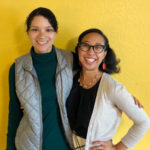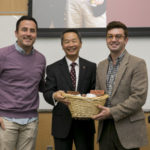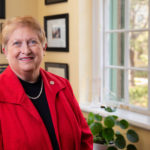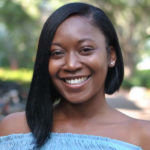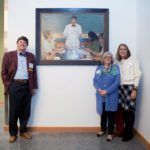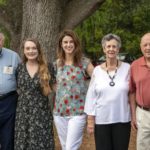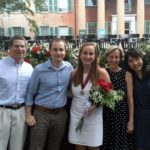Archives For November 30, 1999
How do you make a difference in the world? Victoria Thompson ’15 and her wife, Kourtney Johnson, spent a recent evening in their Tacoma, Washington, home pondering that question. They talked about their education and ways to change the landscape for educators, particularly for people of color.
That’s when they hit upon how they could make a difference. Despite being very early in their careers, they decided to create a scholarship to help education majors at the College of Charleston offset the financial challenges of their clinical internship semester, with a preference toward students of color.
“The bottom line is that there are not enough educators of color,” says Thompson, who majored in elementary education at CofC. “I was the only Black woman in my graduating class, and one reason why is the lack of incentive to pursue a career as an educator. Becoming an educator requires a lot of sacrifice. While there is a lot of personal return as a teacher, there is not a lot of financial return. That’s why dedicating a semester [to student-teaching] without payment or part-time work serves as a huge obstacle for educators.”
Click here to read more on The College Today
Dennis Wright says he never planned on being a teacher. It wasn’t until he was encouraged to enroll in the South Carolina Teacher Cadet program during his senior year of high school that his “eyes were opened” to a career in education.
“I realized that I could have an impact on the kids that need it the most,” says Wright, who is one of eight freshman students recruited to the College by Anthony James, director of the Call Me MISTER (Mentors Instructing Students Toward Effective Role Models) program.
“Many of these young men have never had a minority male teacher, and part of my job is to visit high schools and let them know that teaching is a viable career,” says James.
Call Me MISTER is a state-wide program that was founded at Clemson University in 2000 and brought to the College of Charleston in 2007. Frances Welch, interim provost and executive vice president of academic affairs, worked with Acting Associate Dean of the School of Education, Health, and Human Performance Andrew Lewis and South Carolina Representative and former MISTER Director Floyd Breeland to enroll a half dozen students that first year.
Click here to read more on The College Today
From the moment Kionnie Epps (pictured) stepped foot on its campus, the College of Charleston felt like home. And, as we all know, family is what makes a place a home.
“The College of Charleston family is wonderful,” says Epps, noting that the Office of Admissions’ Ken Grimmage and Fred Quick both reached out to her after her initial visit. “They made me feel really wanted, like I’d be a valuable part of campus. And the College of Charleston’s minority population is just so supportive and welcoming – like a family within the greater CofC family.”
Also supportive and welcoming: The Cracraft family.
“The Cracrafts and their generosity mean everything to me,” says Epps, a senior public health major and a recipient of the Cracraft Family Endowed Scholarship.
Inspired by the Willard A. Silcox ’33 Memorial Scholarship that their daughter, Kellee Ann ’15, received while a student at the College, Scott Cracraft ’83 and Janet Cracraft ’85 established the Cracraft Family Endowed Scholarship in 2015.
Click here to read more on The College Today
“We’re just wild about Harry” was the phrase in the mind and hearts of nearly 300 friends and former students of Harry W. Freeman ’43 in establishing an endowed scholarship upon his retirement from the College in 1990. The sentiment also served as the theme for the gathering – where the new scholarship was announced – to honor his 39 years of service to the College.
“Anyone who was lucky enough to have had Dr. Freeman as a teacher remembers him as a special person, the quintessential professor and one who will be deeply honored if the scholarship drive is successful,” says James Smiley, then-chair of the department of biology.
The drive’s success is indisputable, as nearly $150,000 was raised toward the original $100,000 goal. As a distinguished professor and chair of biology as well as past president of the Alumni Association, it’s only appropriate that Freeman’s scholarship supports both areas.
The scholarship, awarded by the Alumni Association, pays tribute to his unwavering loyalty to the College and is available to relatives of alumni. John C. Duane ’94, son of John P. Duane Jr. ’57 and Ann Wulbern Duane ’60, was selected as the inaugural recipient. After graduating from the College, he attended the University of South Carolina School of Law and was selected as the 2014 Assistant U.S. Attorney of the Year, Charleston Division. He is now senior counsel at Motley Rice LLC.
When you have more than 300 senior citizens passionate about lifelong learning, like at the College of Charleston’s Center for Creative Retirement (CCR), it’s only natural that a scholarship for younger students would emerge.
In its 25th year, CCR is composed of a diverse group of seniors who share an enthusiasm for education. This self-governing group holds weekly meetings throughout the academic year and offers field trips to historical and cultural sites.
In 2004, CCR established the Center for Creative Retirement Scholarship. Today, it provides $5,000 a year in scholarships to students studying gerontology at CofC.
“With our growing aging population, it’s important that we recognize students who are focusing on the gerontology discipline,” says Jean Marterre, chair of the CCR scholarship committee. “In fact, it would be great to see a gerontology major or even a minor at the College.”
Kylie Vorhis, represents the 19th student to receive the gerontology scholarship. Vorhis, a sociology major and psychology minor, has taken two gerontology-related courses, works with respite care and conducts home visits for a life-care company in Charleston.
Before graduating, astrophysics major Wendell Roberson ’18 conducted a research project titled, “Numerical Simulations of the Interaction Between Planets and Protoplanetary Disks.”
“I studied how planets that are roughly the size of Earth migrate within a gaseous disk,” says Roberson. “We did this through simulations using a code that is written to help simulate these developments.”
The “we” includes his faculty adviser, Ana Uribe, but he might also be referring to Horatio Hughes ’05 (that’s 1905) – who taught chemistry and physics at the College from 1923 to 1950 – given that his eponymous scholarship covered the cost of Roberson’s research and other expenses.
“The scholarship really helped put my mind at ease,” says Roberson. “You want to make sure you have done everything you needed to do to ensure that all of the money you need is there for the year, and, with the scholarship, I knew I was covered in some areas.”
Hughes’ daughter Patricia Hughes Farrow ’48 and her husband, Thomas Ferguson Farrow ’49 (the two met while at CofC) established the Horatio Hughes Memorial Scholarship in 2011 through a charitable trust that began funding scholarships after both had passed away. The trust funds about $30,000 in scholarships for 10-15 science students a year, along with a handful of research stipends, like Roberson’s.
Most anyone in South Carolina with the slightest interest in dance would recognize the name Robert Ivey. After all, for decades, the late local legend attached to that name was a beloved dancer, choreographer, instructor and College of Charleston professor. In each of those roles, he lifted others up, often in every sense of the word. In doing so, Ivey was able to share with them the moving power of dance.
In 2017, the College of Charleston’s Robert Ivey Scholarship in Dance became fully endowed thanks to a reinvigorated effort by friends and family. Among those leading the philanthropic charge were Matthew Kennedy ’01, a former student of Ivey while on a dance scholarship at the College, and adjunct professor Eliza Ingle, a close colleague of Ivey.
Because of these efforts, which doubled the fund, the scholarship is primed to ensure that others are able to follow in Ivey’s path and similarly uplift others.
“He was one of the first people to teach dance at the College,” says Todd McNerney, associate dean of the School of the Arts, who attributes Ivey as being instrumental in starting the dance program at the College.
Ivey began teaching at the College in the early 1980s and became a full-time professor in 1993. He taught dance technique in ballet and modern 20th-century dance, introduction to theater, history of dance, choreography, dance ensemble and the popular Maymester course on the Spoleto Festival.
If there is a clear constant for James Mulvaney and his family, it may likely be a commitment to education. After all, the Mulvaneys count among their ranks career educators, such as James’ wife Carol and his daughter Christine, and other family members, like his late father William and son Patrick, who have demonstrated a deep interest in teaching those around them.
At the College of Charleston, the Mulvaney Family has made a vested commitment to furthering the education field by way of their philanthropy. In 2016, they established the William and James Mulvaney Family Endowed Scholarship to support a declared education major at the College of Charleston in the School of Education, Health, and Human Performance.
James Mulvaney first came to appreciate the importance of education from his father, who is recognized in the scholarship’s name.
Middle grades education major Rodrick Bellamy is a recipient of the Mulvaney Scholarship.
A renowned urologist in Cincinnati, William Mulvaney developed two drugs to dissolve kidney stones. He then placed the proceeds from that work in a charitable trust, which is managed by James Mulvaney and his siblings. The endowed scholarship at the College of Charleston was created with a $150,000 donation from the trust.
“He felt that everyone should be treated the same and have the same opportunities,” says James Mulvaney of his father, recalling how as a child he had observed the physician treating everyone at the hospital with equal respect.
William Mulvaney was also pioneering in his championing of diversity, often breaking new ground in his hiring of minorities in the Ohio medical community. In light of this, the scholarship endeavors to provide support in particular to minority, male undergraduate students at the College who are majoring in middle grades education.



